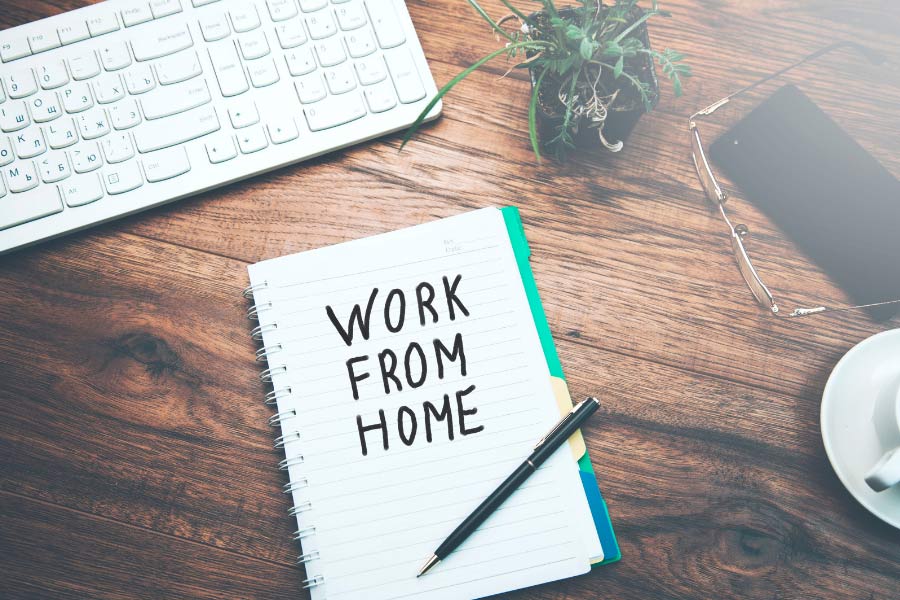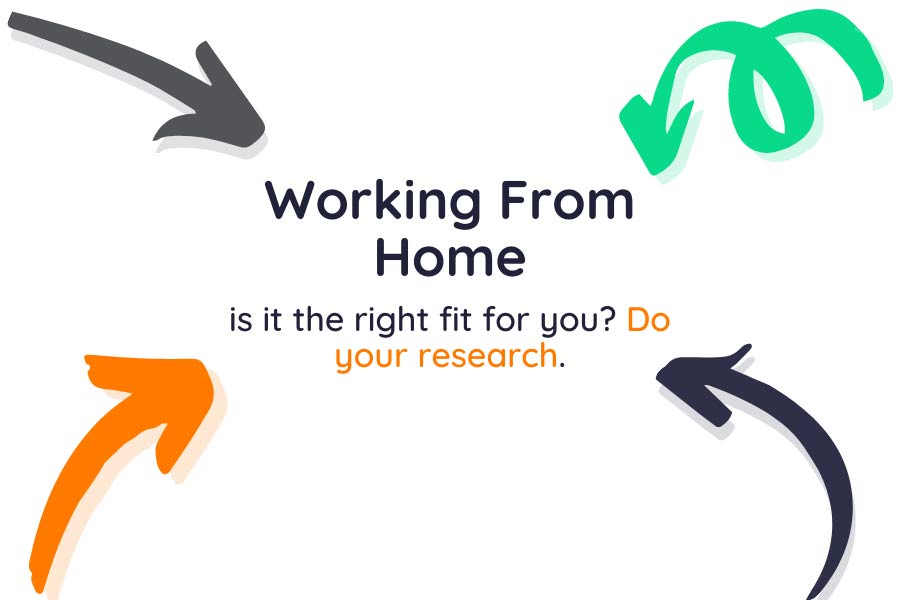Attitudes towards working from home have been transformed by the coronavirus pandemic. Although it started as a necessity, many companies now offer work-from-home roles. You will find many job roles that are set up with a hybrid approach where employees split their time between home and the office.
Has the concept of ‘office working’ changed forever?

Ten years ago, working from home was pretty exclusive to freelancers and business owners. In 2015, only 14% of workers in Britain did some work from home. By April 2020 that was up to 46%. Five years later, so many are set up for it, working from home is now the norm.
In reality, working from home is the dream for some, and a nightmare for others. This probably depends on your personality traits. Here’s a run-down of the best and worst bits of working from home.
Perks of work from home jobs

No commute means more time for you
This has got to be one of the biggest perks: saving time and money. Have you ever totalled up how much money you spend on commuting in a year? Or the percentage of your working day that is spent travelling? If your working day actually starts at 9am (rather than whenever you had to leave the house before), then you have so much time in the morning to do whatever you want to do…have breakfast with the family, go for a run or just have an extra hour in bed!
Improved work-life balance
Due to not having a commute, many home workers find they have a better work-life balance, and typically feel less stressed when working from home. Having a long commute is proven to have a negative effect on your mental wellbeing. According to a recent study, commuters are 46% more likely to get less than 7 hours of sleep and 33% more likely to have depression!
Increased productivity
No more tea breaks turning into a 45-minute gossip! Or someone stopping you in the corridor and asking you to do this ‘one quick thing’ that actually ends up taking an hour and a half. Of course, people will still give you work at home, but everything feels a little more purposeful and structured when it is done over email rather than mentioned in passing.
Healthier lifestyle
You probably get more sleep and you have more time to take care of yourself. You’re much more likely to take the time to make a healthy lunch rather than running to Pret (another way to save £7 a day!) And think of all the germs you avoid by not getting on a train or going into an office (not just covid but even the common cold).
Work in comfort
When at home, you are free to wear what you want and work wherever you want. Do you find formal wear restrictive and uncomfortable? Wear your tracksuit! You can also design your ‘office’ however you want. Choose your own chair and desk, choose your own décor, play music out loud…it’s your space!
Obviously, these things are great, and working from home definitely allows you more flexibility. But this lifestyle is more suited to a certain type of person. To be productive whilst working at home you have to have high amounts of self-discipline and self-motivation. You have to be able to organise yourself and you have to be able to work well alone.
If you respond better to motivation from others, you like having a routine and you’re easily distracted, then you might find you’re better suited to working in an office.
The challenges of work from home jobs

No separation of work and leisure
This is probably the number one complaint. Depending on the size of your home, you might literally eat, sleep, work and relax in the same 1 or 2 rooms. You might also find it hard to ‘clock off’ at the end of the day, and end up working into the evenings. Without the physical separation of workplace and home, it can be hard to mentally switch off from work.
Lack of social interaction
This is particularly tough if you live alone. If you don’t leave the house for work, you might find yourself going days without physically seeing another person and this can be tough. Whilst a colleague wanting a gossip by the coffee machine can be distracting, it can also be a welcome break in the working day. Many people build strong and long-lasting friendships with their work colleagues, and this can be a lot harder to do remotely.
Lack of collaboration
Whether this is formal or informal, many people like to bounce ideas off other people to improve their creativity. When you share an office with someone, it’s easy to quickly ask “what do you think of this?” or “could you quickly help me with this?”. This is much harder if everyone is working from home. Of course, you can pick up the phone to someone, but it’s not quite the same as a spontaneous chat.
Too many distractions!
Whilst you may not have colleagues to distract you at home, there are plenty of other things that might distract you: the TV, Instagram, the laundry, your dog etc. When you know there’s no boss watching over your shoulder, it can be easier to do other things during work hours that you would never do in the office.
Unhealthy lifestyle
Yes, working from home gives you the gift of time to improve your lifestyle. But this relies on you having the motivation to actually do it. When working from home it’s possible to go the whole day without walking further than the fridge. You have to make a conscious effort to go outside and get fresh air. Maybe you used to include a walk, run or cycle in your commute, but now you no longer have to go out, you find it hard to make yourself do it.
Are Work From Home Jobs For You?

So, do you think you are suited to work from home jobs? Does it make you healthier, more productive and less stressed? Or does it make you lonely, more distracted and less efficient? Given the choice, would you prefer to work from the office, from home or a mixture of the two?
If you think that you’d like to pursue a change in career to work from home then your next step is to visit Career Street.
Our app allows you to use a video to show employers what you’re really like.

